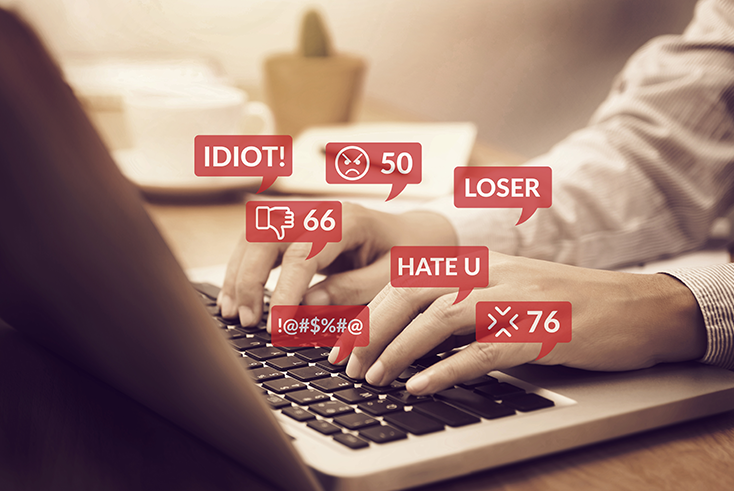Online abuse is rife in the media and finally someone is tackling it

Opinion
If the media doesn’t do more to protect the journalists working under their banners, they’re sending a message that abuse is just a part of the job.
Not but two years ago I wrote a piece for a women’s lifestyle media brand about how irritating single women find it to be labelled ‘too picky’ (something I still stand by so be careful what you say next time you’re out with a friend who’s on the dating scene). It’s a hugely popular site with millions of readers and social media followers.
So I shouldn’t have been too surprised when I experienced my very first troll, lurking in the comments section.
Clearly triggered by my belief that a woman shouldn’t feel pressured to go out with a person just because they’re ‘nice,’ the commenter let rip an invective on how awful I must be, that I was clearly ugly and that I deserve to die alone.
These comments seemed so ludicrously vicious, so over the top, that I was able to laugh them off, but this isn’t always possible. Online attacks can be hugely detrimental – both mentally and physically – and can even jeopardise the safety of those involved.
According to Unesco, three-quarters of women journalists have experienced some form of online violence in relation to their work during their career, with a quarter being subject to threats of physical violence and a fifth even experiencing real-life attacks.
Finding ways to join forces
Sadly, I’ve seen this evidenced in my own circle of friends. A former colleague suffered attacks about her physical appearance after posting photos from London Fashion Week mere weeks ago. Another was subject to anti-Semitic remarks and a tirade of verbal abuse on everything from her ability to do her job to her looks after reporting on new research about London cabbies.
The abuse came from a group of middle aged men, by the way. She was a 21-year-old intern at the time.
That’s why it’s such good news that Reach, which recently appointed Rebecca Whittington as its new online safety editor (an industry first), is building an XX Directory – a list of women within the media industry who are fighting to reduce the abuse experienced by all journalists around the world.
The idea, Whittington says, is to find ways to join forces – to work together to make a greater and farther-reaching impact.
This couldn’t have come at a more vital time. As we know, reporters on the ground in Ukraine and surrounding countries are doing their best to accurately document what is happening over there – something made more complex by the unverified civilian footage and information emerging across social media.
This isn’t even just by those who are pro-Putin, either. A little over a week ago, the story that the war itself is a hoax went viral and the UK government had to actually create public service announcements teaching people how to tell the difference between real and fake news. Why is this relevant, you might ask?
Well, those war reporters I mentioned earlier are the ones in the metaphorical (as well as physical) firing line. In fact, several have commented over the last week on Radio 4’s Today programme that they’ve been subject to heightened levels of abuse in recent days because of growing levels of mistrust.
A duty of care for journalists
The reason I’m singing from the rooftops about this news from Reach is because if the media industry doesn’t find a way to tackle this abuse, it runs the risk of losing some of its top talent.
Of course, it’s almost impossible for companies to manage the discourse that takes place on social media, but they do have some control when it comes to the comment sections on their websites.
Some have chosen to protect the journalists under their banners by deleting them altogether. Vice, for example, got rid of theirs back in 2016, along with other media giants like Reuters – while others like The New York Times have invested heavily in making them better. But the truth is, too many media brands have left them woefully unattended – as if hoping that by ignoring them, these trolls will simply go away.
And while not all commenters are abusive – on the ‘Too Picky’ article I wrote, there was plenty of positive commentary – these sections at the end of articles are often where the fires are started.
 Bianca Barratt
Bianca BarrattLong known as the Wild West of the internet, journalists have come to understand that they are usually where empathy, balance and decorum go to die. While offering audiences a platform to discuss what they’re consuming is a vital part of democracy, the simple fact is there should be a duty of care for professional content creators.
If the media doesn’t do more to protect the journalists working under their banners, they’re sending a message that abuse is just a part of the job.
When you’re being shot at by the military in a war zone, or reporting on the insidious stripping of women’s reproductive rights around the world, this is hardly an incentive to keep reporting the truth unfiltered and without apology.
And, if the truth starts being filtered, it won’t be long before the news actually does become fake.
More initiatives like this need to happen and the sooner they do, the better for everyone – reporters, consumers and even the trolls tapping away in the dark, too.
Bianca Barratt is a freelance journalist and editor and writes features across business, lifestyle and culture. A former lifestyle writer and shopping editor for the London Evening Standard, she is now a senior contributor to Forbes Women and has written for titles including The Sunday Times, Independent, Cosmopolitan, BBC Good Food and Refinery29. She writes for The Media Leader each month.
Media Leaders: The Media Leader’s weekly bulletin with thought leadership and analysis by the industry’s best writers and analysts.
Sign up for free to ensure you stay up to date every Wednesday.



